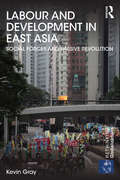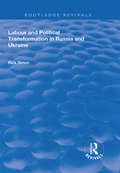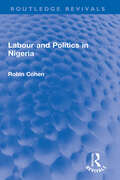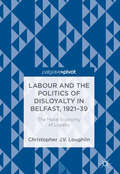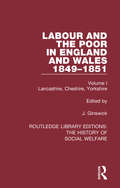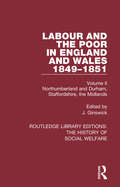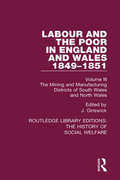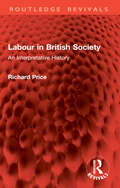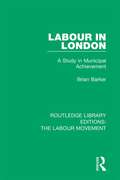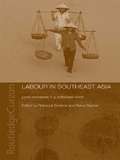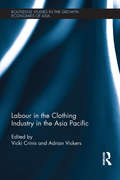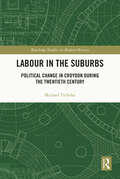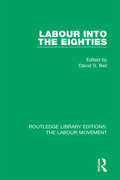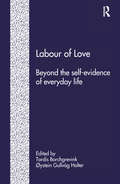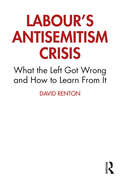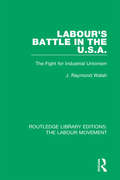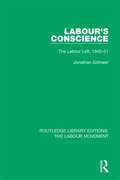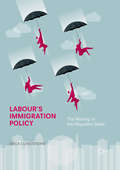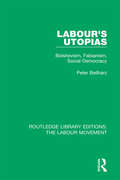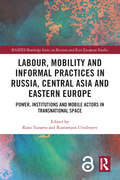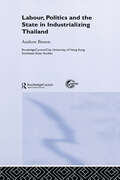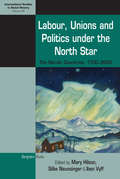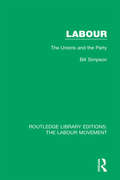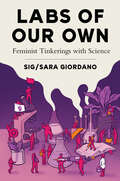- Table View
- List View
Labour and Development in East Asia: Social Forces and Passive Revolution (Rethinking Globalizations)
by Kevin GrayThe Chinese Communist Party’s response to the wave of factory strikes in the early summer of 2010 has raised important questions about the role that labour plays in the transformation of world orders. In contrast to previous policies of repression towards labour unrest, these recent disputes centring round wages and working conditions have been met with a more permissive response on the part of the state, as the CCP ostensibly seeks to facilitate a transition away from a model of political economy based on ‘low-road’ labour relations and export dependence. Labour and Development in East Asia shows that such inter-linkages between labour, geopolitical transformations, and states’ developmental strategies have been much more central to East Asia’s development than has commonly been recognised. By adopting an explanatory framework of the labour-geopolitics-development nexus, the book theorises and provides an historical analysis of the formation and transformation of the East Asian regional political economy from the end of the Second World War to the present, with particular reference to Japan, South Korea, Taiwan and China. This book will be required reading for students and scholars of international relations, development studies and comparative politics.
Labour and Political Transformation in Russia and Ukraine (Routledge Revivals)
by Rick SimonThis title was first published in 2000. The years 1975 to 2000 are characterized by fundamental changes in the global political landscape. Perhaps the biggest change was the collapse of certain communist regimes. This text analyzes what that meant for the USSR and Europe. It looks at the cause of change, the social forces behind them and future prospects.
Labour and Politics in Nigeria (Routledge Revivals)
by Robin CohenOriginally published in 1974 and with a new introduction for the 1981 edition, this book is a clear and vivid history of the role of organized labour in the politics of Nigeria. It covers the period from the first General Strike of 1945 to the civil war and reintegration of the country. As well as providing an analysis of the characteristics and attitudes of Nigeria’s wage earners, this study is concerned with their place in the wider political and social life of the country. The attempts of the trade unions to create a representative central labour organisation are considered, as is the internal structure of the unions themselves. The book also examines the relationship of the Unions with the political parties of the first Republic and later with the Military Government. The influence of the trade unions in the determination of wage rates is analysed. The book concludes with an overview of trade unions in other parts of Africa with which the performance and characteristics of organized labour in Nigeria are compared
Labour and the Politics of Disloyalty in Belfast, 1921-39: The Moral Economy of Loyalty
by Christopher J. V. LoughlinThis book provides the first ‘history from below’ of the inter-war Belfast labour movement. It is a social history of the politics of Belfast labour and applies methodology from history, sociology and political science. Christopher J. V. Loughlin questions previous narratives that asserted the centrality of religion and sectarian conflict in the establishment of Northern Ireland. Labour and the Politics of Disloyalty in Belfast, 1921-39 suggests that political division and violence were key to the foundation and maintenance of the democratic ancien régime in Northern Ireland. It examines the relationship between Belfast Labour, sectarianism, electoral politics, security and industrial relations policy, and women’s politics in the city.
Labour and the Poor in England and Wales - The letters to The Morning Chronicle from the Correspondants in the Manufacturing and Mining Districts, the Towns of Liverpool and Birmingham, and the Rural Districts: Volume I: Lancashire, Cheshire, Yorkshire (Routledge Library Editions: The History of Social Welfare)
by J. GinswickThe Morning Chronicle presented the state of the working classes of Britain before the public with clarity, insight and honesty. Consisting mainly of verbatim statements from the people themselves, it was a medium through which the previously inarticulate masses were able to speak with one firm voice. First published in 1983, this book collates the letters from correspondents based in Lancashire, Cheshire and Yorkshire. The letters improve our knowledge of working-class life in nineteenth century England and Wales and provide a unique insight into the impact of industrialization. This book will be of interest to those studying the history of the working class, labour and poverty.
Labour and the Poor in England and Wales - The letters to The Morning Chronicle from the Correspondants in the Manufacturing and Mining Districts, the Towns of Liverpool and Birmingham, and the Rural Districts: Volume II: Northumberland and Durham, Staffordshire, The Midlands (Routledge Library Editions: The History of Social Welfare)
by J. GinswickThe Morning Chronicle presented the state of the working classes of Britain before the public with clarity, insight and honesty. Consisting mainly of verbatim statements from the people themselves, it was a medium through which the previously inarticulate masses were able to speak with one firm voice. First published in 1983, this book collates the letters from correspondents based in Northumberland and Durham, Staffordshire and the Midlands. The letters improve our knowledge of working-class life in nineteenth century England and Wales and provide a unique insight into the impact of industrialization. This book will be of interest to those studying the history of the working class, labour and poverty.
Labour and the Poor in England and Wales - The letters to The Morning Chronicle from the Correspondants in the Manufacturing and Mining Districts, the Towns of Liverpool and Birmingham, and the Rural Districts: Volume III: The Mining and Manufacturing Districts of South Wales, North Wales (Routledge Library Editions: The History of Social Welfare)
by J GinswickThe Morning Chronicle presented the state of the working classes of Britain before the public with clarity, insight and honesty. Consisting mainly of verbatim statements from the people themselves, it was a medium through which the previously inarticulate masses were able to speak with one firm voice. First published in 1983, this book collates the letters from correspondents based in Wales. The letters improve our knowledge of working-class life in nineteenth century England and Wales and provide a unique insight into the impact of industrialization. This book will be of interest to those studying the history of the working class, labour and poverty.
Labour in British Society: An Interpretative History (Routledge Revivals)
by Richard PriceWhat part has organized labour played in the history of modern Britain? To what extent has British society been shaped by working class organization in industry and labour in politics? A major reinterpretation of the relationship between the history of the working class and the history of British society from 1780 to 1980, Labour in British Society (originally published in 1986) traces two recurrent themes—how the pattern of social relations in industry has developed since the Industrial Revolution, and how these patterns have been affiliated to national political and economic developments. This book is a must read for students and researchers of history.
Labour in London: A Study in Municipal Achievement (Routledge Library Editions: The Labour Movement #1)
by Brian BarkerFirst published in 1946. This title is a clear and concise account of the march of Labour to the control of the London County Council and its work at County Hall in the 1940s. This study explores the rise of the Labour Party in London and the changes and progress in health, education, and social welfare. Labour in London will be of interest to students of history and politics.
Labour in Southeast Asia: Local Processes in a Globalised World (Changing Labour Relations in Asia)
by Rebecca Elmhirst Ratna SaptariIn seeking to provoke debate, the book reveals the variety of experiences evident in countries and regions marked by capitalist and (post) socialist regulatory frameworks, and contrasting labour regimes, histories and cultures. The contributions show the importance of critically examining both the complex nature of global-local links and the particular ways economic processes are around the themes of labour regimes, labour processes, labour mobility and labour communities, the essays show how economic development is not only shaped by market forces but is also interlocked in systems of meaning.
Labour in the Clothing Industry in the Asia Pacific (Routledge Studies in the Growth Economies of Asia)
by Adrian Vickers Vicki CrinisThe clothing industry provides employment for 60 million workers worldwide. More than a quarter of these workers are employed in the Asia-Pacific region, where the industry is based on subcontracted production on behalf of international buyers. Rapid movements of manufacturing activity from country to country in search of cost advantages make clothing workers part of a globalizing labour market where they increasingly suffer from job insecurity. This book presents carefully researched case studies which highlight the ways in which labour is informalized, fragmented and made disposable by the globalization of production. Chapters address issues pertaining to rights and citizenship, and new forms of activism and organization in conjunction and coordination with diverse support groups, consumers, and wider global campaigns. Contributors further examine the role of the nation state, government regulatory bodies, as well as independent monitoring systems such as the International Labour Organization. Although there has been considerable effort directed to understanding how firms operate across multiple countries – in studies of the organization of global production networks, and the implications for complexities of scale, (de)territorialization and state development projects – there has been far less focus on how these processes produce precarious labour and reshape worker consciousness. Offering new insights into the understanding and support of workers in the global textile and garment industry, this book will be of interest to academics in a variety of disciplines including Asian Studies, sociology, political economy, development, human rights, labour and gender.
Labour in the Suburbs: Political Change in Croydon During the Twentieth Century (Routledge Studies in Modern British History)
by Michael TichelarThis book is the first comprehensive economic, social and political study of the London suburb of Croydon from 1900 up to the present day. One of the largest London boroughs, Croydon, has always been a mixed residential suburb (mainly private but with some municipal housing), which has strongly influenced the nature of its political representation. It was never just an affluent middle-class suburb or ‘bourgeoise utopia,’ as suggested by traditional definitions of suburbia and in popular imagination. In economic terms it was also an industrial suburb after 1918. It was then transformed into a vibrant post-industrial service economy following rapid deindustrialisation and remarkable commercial and office redevelopment after 1960. In this respect Croydon is also an ex-industrial suburb, similar to many other outer London areas and other peripheral metropolitan areas. Croydon’s civic identity as a previously independent town on the outskirts of London remains unresolved to this day, even as its political representatives seek to redefine the borough as a more independent ‘Edge City.’ Author Michael Tichelar examines this suburb by looking at the suburban development of London, the changing politics of Croydon and policy issues during the twentieth century. Labour in the Suburbs will be of interest to the general reader as well as students of modern British history with special interests in electoral sociology, political representation and suburbanisation. It provides a template against which to measure the process of suburbanisation in the UK and internationally.
Labour into the Eighties (Routledge Library Editions: The Labour Movement #3)
by David S. BellFirst published in 1980. This book covers areas of policy interest viewed from a social democratic perspective and each chapter takes a specific issue which would have been of concern to Labour in the 1980s, including some of the more controversial areas. The study reviews various problem areas and suggests policies which are realistic and applicable in the conditions of the 1980s. This title will be of interests to scholars and students of history and politics.
Labour of Love: Beyond the Self-Evidence of Everyday Life
by Øystein Gulvåg HolterAmazed at the stubborn nature of the sexual division of labour in modern society, five Norwegian researchers set out to explore the sources of this pervasive resistance to change. Moving from the neutral concepts of work and money, the lofty notions of love and family and the triviality of domestic organization, social science is made to yield some surprising insights into hidden, secret and perhaps even sacred structures of everyday life. A provocative claim in these pages is that the practical arrangement in the family is informed by the erotic properties of work and semi-religious notions of poverty and dirt - and is sustained by both sexes. This anthology reveals some perplexing aspects of contemporary self-understanding and rediscovers sexual meaning as a pillar of modern culture. The book is an invitation to reconsider the conditions for gender equality and to explore further the cultural tangle behind this persistent tolerance for injustice within European thinking.
Labour's Antisemitism Crisis: What the Left Got Wrong and How to Learn From It
by David RentonBetween 2015 and 2020 the Labour Party was riven by allegations that the party had tolerated antisemitism.For the Labour right, and some in the media, the fact that such allegations could be made was proof of a moral collapse under Jeremy Corbyn’s leadership. Sections of the left, meanwhile, sought to resist the accusations by claiming that the numbers of people accused of racism were few, that the allegations were an orchestrated attack, and that those found guilty were excluded from the party. This important book by one of Britain’s leading historians of anti- fascism gives a more detailed account than any yet published of what went wrong in Labour. Renton rejects those on the right who sought to exploit the issue for factional advantage. He also criticises those of his comrades on the left who were ignorant about what most British Jews think and demonstrated a willingness to antagonise them.This book will appeal to anyone who cares about antisemitism or left- wing politics.
Labour's Battle in the U.S.A: he Fight for Industrial Unionism (Routledge Library Editions: The Labour Movement #42)
by J. Raymond WalshFirst published in 1938. This study of the labour crisis in the USA consists of interviews with leaders and members of labour unions, unorganised workers, businessmen, and those in positions of public responsibility. The author explores the foundations of the crisis, and examines the possible issues that he predicted the US labour force were going to encounter. This title will be of interest to scholars and students of political and labour history.
Labour's Conscience: The Labour Left, 1945-51 (Routledge Library Editions: The Labour Movement #30)
by Jonathan SchneerFirst published in 1988. The years 1945-51 were crucial to the Labour Party and the Left in Britain. This elegantly written book traces the gradual and painful disillusionment of the Labour Left with the Attlee governments and analyses the alternative, more militant, programme which the Labour Left devised. Never an organised bloc, the author argues that they are best understood as Labour’s conscience – a militant tendency is the true sense of the words. This title will be of interest to scholars and students of political history.
Labour's Immigration Policy
by Erica ConsterdineThis book explains how and why the New Labour governments transformed Britain's immigration system from a highly restrictive regime to one of the most expansive in Europe, otherwise known as the Managed Migration policy. It offers the first in-depth and candid account of this period of dramatic political development from the actors who made policy during 'the making of the migrant state. ' Drawing on document analysis and over 50 elite interviews, the book sets out to explain how and why this radical policy change transpired, by examining how organized interests, political parties and institutions shaped and changed policy. This book offers valuable insights to anyone who wants to understand why immigration is dominating the political debate, and will be essential reading for those wanting to know why governments pursue expansive immigration regimes.
Labour's Utopias: Bolshevism, Fabianism, Social Democracy (Routledge Library Editions: The Labour Movement #2)
by Peter BeilharzFirst published in 1992. The collapse of communist rule in Eastern Europe has led to a widespread view that socialism is a dead, or at least dying, force. Labour’s Utopias argues that this assumption is based on the popular conception that socialism’s various traditions are simply different means to a common end. The author looks at three strands of socialism – Bolshevism, Fabianism and German Social Democracy – in order to assess whether this argument is justified, concluding that in fact each has a distinct vision of an ideal future. This study will appeal to scholars and students of politics, history and socialism, and to all those with an interest in the alternatives to capitalism.
Labour, Mobility and Informal Practices in Russia, Central Asia and Eastern Europe: Power, Institutions and Mobile Actors in Transnational Space (BASEES/Routledge Series on Russian and East European Studies)
by RanoRustamjon Turaeva UrinboyevThis book explores the daily survival strategies of people within the context of failed states, flourishing informal economies, legal uncertainty, increased mobility, and globalization, where many people, who are forced by the circumstances to be innovative and transnational, have found their niches outside formal processes and structures. The book provides a thorough theoretical introduction to the link between labour mobility and informality and comprises convincing case studies from a wide range of post-socialist countries. Overall, it highlights the importance of trust, transnational networks, and digital technologies in settings where the rules governing economic and social activities of mobile workers are often unclear and flexible.
Labour, Mobility and Informal Practices in Russia, Central Asia and Eastern Europe: Power, Institutions and Mobile Actors in Transnational Space (ISSN)
by Rano Turaeva Rustamjon UrinboyevThis book explores the daily survival strategies of people within the context of failed states, flourishing informal economies, legal uncertainty, increased mobility, and globalization, where many people, who are forced by the circumstances to be innovative and transnational, have found their niches outside formal processes and structures. The book provides a thorough theoretical introduction to the link between labour mobility and informality and comprises convincing case studies from a wide range of post-socialist countries. Overall, it highlights the importance of trust, transnational networks, and digital technologies in settings where the rules governing economic and social activities of mobile workers are often unclear and flexible.
Labour, Politics and the State in Industrialising Thailand (Routledge/City University of Hong Kong Southeast Asia Series)
by Andrew BrownIn this book Brown argues that workers in East and Southeast Asia are significant actors in political change. Critically examining the themes of labour weakness, political exclusion and insignificance of 'class factors' he aims to bring workers back from the margins, demonstrating that both in the present and past the state has been entangled in processes that determine the forms of their struggles. This book presents new empirical data, important historical material and an innovative approach to workers and politics.
Labour, Unions and Politics under the North Star: The Nordic Countries, 1700-2000 (International Studies in Social History #28)
by Mary Hilson Silke Neunsinger Iben VyffDenmark, Finland, Iceland, Norway, and Sweden today all enjoy a reputation for strong labour movements, which in turn are widely seen as part of a distinctive regional approach to politics, collective bargaining and welfare. But as this volume demonstrates, narratives of the so-called “Nordic model” can obscure the fact that experiences of work and the fortunes of organized labour have varied widely throughout the region and across different historical periods. Together, the essays collected here represent an ambitious intervention in labour historiography and European history, exploring themes such as work, unions, politics and migration from the early modern period to the twenty-first century.
Labour: The Unions and the Party (Routledge Library Editions: The Labour Movement #31)
by Bill SimpsonFirst published in 1973. In this study, the author adopts a historical approach, tracing the evolution of socialist thinking during the past century and relating this to the growth of the union movement. The Taff Vale judgement, the Osborne judgement, the roles of the SDF, the Fabians, and the ILP - these episodes are re-examined from a novel perspective, and the historical material is frequently illuminated by the use of contemporary analogies. The second half of the book presents an analytical study of differing union political theories and attitudes against the modern industrial background. Here the Marxist case is studied in depth and contrasted with the views of the Social Democrats. The author then considers the ownership and control of the economy, industrial relations, prices and incomes and inflation, making it clear where he feels the movement should stand on the key political issues of today. Finally, the book suggests the way in which the Labour Party and the trade unions should organise for power in the country.
Labs of Our Own: Feminist Tinkerings with Science
by Sig / GiordanoFrom climate change to COVID-19 to reproductive justice, there has been deep political polarization around science. Labs of Our Own provides a unique entry point into these twenty-first-century science wars by focusing on our affective relationships to science. The book delves into various sites where scientists, teachers, artists, and activists claim to create more democratic access to science—from DIY biology community labs to feminist classrooms to activist science practitioners. The reader will find that these claims for and attempts at democratic sciences not only impact what counts as science and who counts as a scientist but reconfigure who is included in the proper public. Instead of arguing for a knee-jerk defense of science against right-wing attacks, Labs of Our Own builds the case for a feminist, antiracist, decolonial, queer science tinkering practice that intentionally, politically, and ethically acts to produce new challenges to the definition and boundaries of the human.
